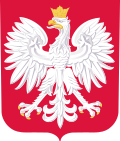Third Cabinet of Donald Tusk | |
|---|---|
| 22nd Cabinet of Poland | |
| 2023–present | |
 Ministers pictured after their swearing-in, 13 December (2023) | |
| Date formed | 13 December 2023 |
| People and organisations | |
| President | Andrzej Duda Karol Nawrocki |
| Prime Minister | Donald Tusk |
| Prime Minister's history | 2007–20142023–present |
| Deputy Prime Ministers | Władysław Kosiniak-Kamysz Krzysztof Gawkowski Radosław Sikorski |
| No. of ministers | 22 [1] |
| Member parties |
|
| Status in legislature | Majority (coalition) |
| Opposition parties |
|
| Opposition leader | Jarosław Kaczyński |
| History | |
| Election | 2023 parliamentary election |
| Legislature term | 10th Sejm & 11th Senate |
| Predecessor | Morawiecki III |
 |
|---|
The Third Cabinet of Donald Tusk is the coalition government of Poland headed by Donald Tusk who was officially nominated and confirmed as the Prime Minister of Poland on 11 December 2023 by the members of the Sejm following the failure of Mateusz Morawiecki's Third Cabinet to secure a vote of confidence. [2] On 12 December, Tusk addressed the parliament and announced members of his cabinet, later that day Tusk's cabinet successfully obtained a vote of confidence with 248 of the 460 MPs voting in the affirmative. [3] [4] He and his cabinet were officially sworn in by president Andrzej Duda on 13 December 2023. [5]
Contents
- Background
- 2023 parliamentary election
- Nomination of Donald Tusk
- Confirmation of the cabinet
- Cabinet
- Supporting parties
- 2025 vote of confidence
- Popular mandate
- Notations
- See also
- References
Tusk previously served as Prime Minister of Poland between 2007 and 2014, President of the European Council between 2014 and 2019, and the president of the European People's Party (EPP) from 2019 to 2022. [6] The opposition's victory in the 2023 Polish parliamentary election and Tusk's return to power in Poland were mostly positively received by the international community, with multiple news outlets pointing to the erosion of certain democratic structures in Poland and the worsening of the country's relationship with the European Union under the former right-wing government led by Law and Justice. [7] [8] [9]

















































